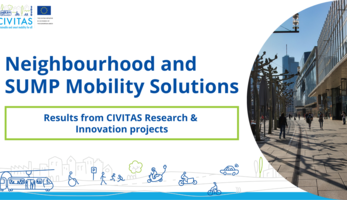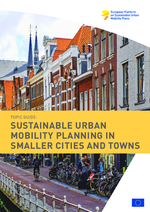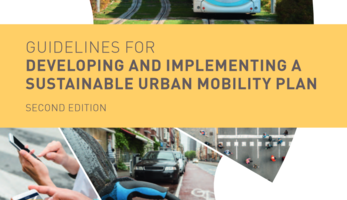SUMPs-Up
SUMPs-Up enabled mobility planning authorities to embrace SUMP as the European-wide strategic planning approach, especially countries with low uptake and badly impacted by the negative effects of transport.

About the project
CIVITAS SUMPs-Up worked to stimulate the adoption of Sustainable Urban Mobility Plans (SUMPs) across Europe, focusing on countries and areas where this was particularly low. The project reviewed, enriched and integrated existing SUMP resources and created a series of new materials alongside these.
The project assisted planning authorities to overcome the barriers that prevent or make it difficult to implement SUMPs by focusing on capacity building, tailored information, and support during the development and implementation phases of SUMPs.
At the core of these activities was a capacity building programme. This consisted of five SUMP Learning Programmes (SLPs) in which groups of cities tested tools for SUMP development and implementation. Furthermore, SUMPs-Up addressed national governments and encouraged them to develop facilitating structures for SUMPs.
At the start of the project, a user needs assessment identified barriers that cities face in the SUMP process. Its findings informed the creation of planning tools, materials and guidance linked to various mobility policy areas.
To test these resources, to work on overcoming barriers set out in the needs assessment, and to facilitate peer knowledge exchange, an Innovation Pilot Pool (IPP) was established. This comprised an Expert Group of 90 cities and a Leadership Group of 10 cities. The five SLPs featured local authorities from the IPP.
Seven city partners acted as role models for other cities: Birmingham (UK), Budapest (Hungary), Malmö (Sweden), Donostia-San Sebastian (Spain), Sofia (Bulgaria), Thessaloniki (Greece), and Turin (Italy). Moreover, the project worked with four countries - Bulgaria, Italy, Romania, and Greece – on elaborating SUMP-supportive programmes at the national level.
Key project outputs included the second edition of the EU SUMP Guidelines; the CIVITAS Tool Inventory (created with CIVITAS SATELLITE); an updated version of the SUMP Self-Assessment Tool; and a series of SUMP Topic Guides.
Through its work with cities in the SLPs, SUMPs-Up also identified key drivers of and barriers to SUMP development and implementation.
Cities
Fast Facts
September 2016 - February 2020
Project duration
14 partners
Project partners
€3,999,921
Project funding























